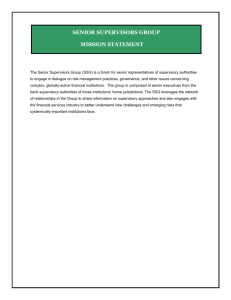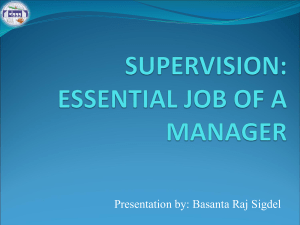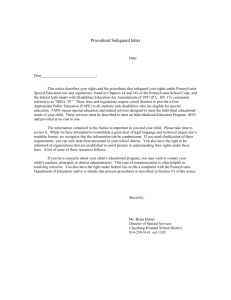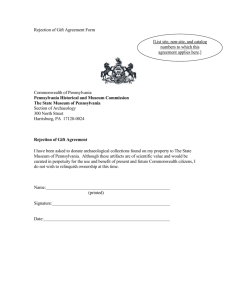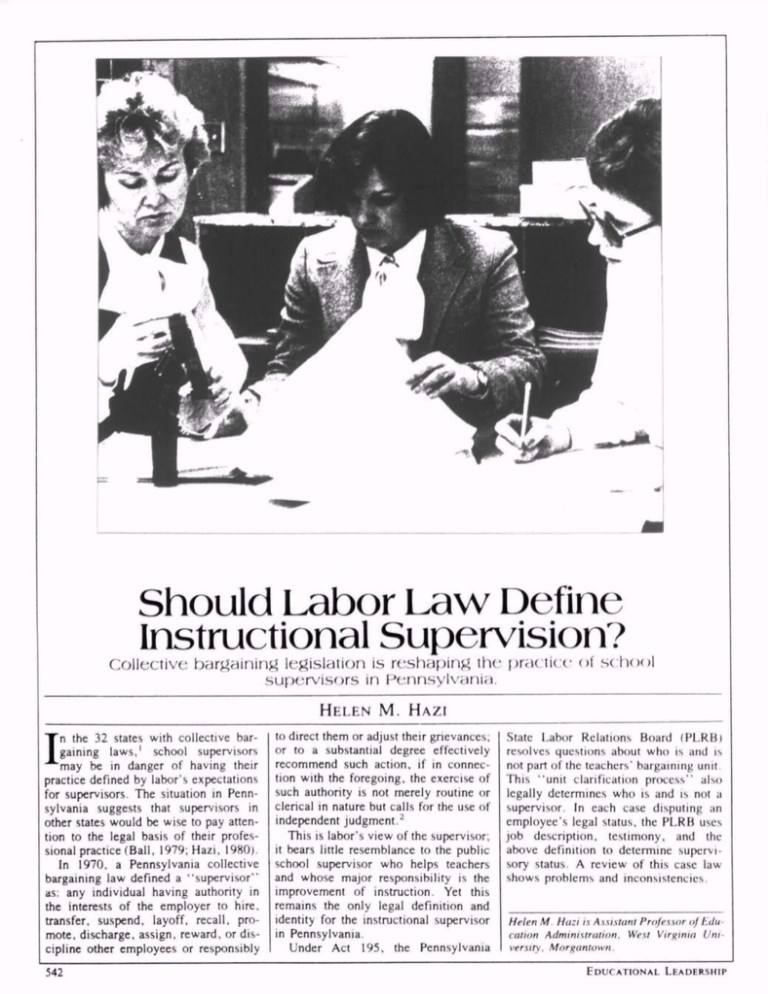
Should Labor Law Define
Instructional Supervision?
Collective bargaining legislation is reshaping the practice of school
supervisors in Pennsylvania.
HELEN M. HAZI
I
n the 32 states with collective bar
gaining laws, 1 school supervisors
may be in danger of having their
practice defined by labor's expectations
for supervisors The situation in Penn
sylvania suggests that supervisors in
other states would be wise to pay atten
tion to the legal basis of their profes
sional practice (Ball, 1979; Hazi, 1980).
In 1970, a Pennsylvania collective
bargaining law defined a "supervisor"
as: any individual having authority in
the interests of the employer to hire,
transfer, suspend, layoff, recall, pro
mote, discharge, assign, reward, or dis
cipline other employees or responsibly
542
to direct them or adjust their grievances;
or to a substantial degree effectively
recommend such action, if in connec
tion with the foregoing, the exercise of
such authority is not merely routine or
clerical in nature but calls for the use of
independent judgment. 2
This is labor's view of the supervisor,
it bears little resemblance to the public
school supervisor who helps teachers
and whose major responsibility is the
improvement of instruction. Yet this
remains the only legal definition and
identity for the instructional supervisor
in Pennsylvania.
Under Act 195, the Pennsylvania
State Labor Relations Board (PLRB)
resolves questions about who is and is
not part of the teachers' bargaining unit
This "unit clarification process" also
legally determines who is and is not a
supervisor. In each case disputing an
employee's legal status, the PLRB uses
job description, testimony, and the
above definition to determine supervi
sory status. A review of this case law
shows problems and inconsistencies.
Helen M Hazi is Assistant Professor of Edu
cation Administration, West Virginia Uni
versity. Morgantown.
EDUCATIONAL LEADERSHIP
The PLRB has given supervisory sta
tus to a number of people whose prac
tice was not related to the improvement
of instruction those holding such titles
as Team Leader. Department Head, and
Athletic Director. A job that included
"observing teachers" was deemed to be
supervisory in one case and nonsupervisory in another.' The PLRB also judged
a position to be supervisory when it in
volved an "authoritative relationship"
and nonsupervisory when it was a
"helping or assisting relationship " 4
The PLRB has not allowed job title or
professional supervisory certification to
influence its decisions. In fact, in one
casc. s the PLRB considered supervisory
certification from the state department
of education "immaterial" to its deci
sion of legal status (Ball, 1979).
Practice Defined by Contracts
Supervisory practice is also being le
gally defined by teacher contracts. An
analysis of selected 1978-79 teacher
contracts revealed many detailed state
ments regarding teacher evaluation, inservice, and the curriculum (Hazi.
1980). They specified, for example, the
purpose of evaluation, who evaluates,
how often, how the evaluation is con
ducted, and how the evaluation report is
to be prepared and distributed. Con
tracts also specified conditions concern
ing the use of electronic devices, the
basis of evaluation, complaints used in
evaluation, information not to be used,
conferences, and efforts of improve
ment.
Provisions such as these can be in
cluded in teacher contracts because of a
legal "catch 22." The courts have indi
cated that any item not explicitly de
fined or prohibited by state statute can
be bargained. Because state statutes fail
to define explicitly the instructional
supervisor or instructional supervisory
practice, these matters are being legally
defined in teacher contracts.
Collective bargaining law, the unit
clarification process, case law, and
teacher contracts are legally defining
and thereby controlling supervisory
practice in Pennsylvania. Supervisors in
other states should begin to pay atten
tion to the legal basis for their own pro
fessional practice.
'The 18 states without collective bargain
ing laws are Alabama. Arizona, Arkansas,
Colorado, Georgia, Illinois. Kentucky.
Louisiana. Mississippi, New Mexico, North
Carolina. Ohio. South Carolina. Texas,
Utah, Virginia, West Virginia, and Wyo
APRIL 1982
ming See Cuebook II Stale Education Col
lective Bargaining Laws ( Denver: Education
Commission of the States. 1980)
' School Laws of Pennsylvania ( 1971) as
amended (1973). Sec 3380.301(6). Act 195
was passed in 1970 and made part of the
School Laws of Pennsylvania in 197?
1 Eastern York School District ( Case No
PERA-U-5512-C). 6 Pennsylvania Public
Employee Reporter 22 ( 1975)
*Tamaqua Area School District ( Case No
PERA-U-8309-C). 7 Pennsylvania Public
Employee Reporter 253 (1976)
""Erie School District ( Case No PERAU-8209-W). 7 Pennnlvama Public Em
ployee Reporter 254 (1976)
References
Ball. S "A Study of the Legal Status of
the Public School Supervisor in the State of
Pennsylvania Through an Analysis of the
PL.R.B Unit Clarification Proceedings."
Ph D dissertation. University of Pittsburgh.
1979
Hazi. H "An Analysis of Selected
Teacher Collective Negotiation Agreements
in Pennsylvania to Determine the Legal
Control Placed on Supervisory Practice."
Ph D dissertation. University of Pittsburgh.
1980
CALL FOR MANUSCRIPTS
We are tentatively planning the following theme issues, of Educational Leadership i n t982-83:
Deadline* for
Manuscripts
Month
Theme
(Vlolx-r
Statt Development
Characteristic*- ^r>d exam
ples ot ettective training
and development pro
grams tor teachers
Teamwork
Team management Inter
nal politics ot schools
Examples ot successful
collaboration with busi
ness and community
|ul\ 1
Case studies ol effective
schools Examples ot
programs tor increasing
effectiveness
August 1
The case tor viewing
teaching as artistry, with
implications tor teacher
September 1
tinp t tlecln
oK
The A rt a nd Cr
ot Teaching
1962
19R2
19fl2
preparation, mservice.
and evaluation
nprming P roduc
i Idut a tion
Teat. h
Youth
April
(Opent
Mav
Preparing to
Future
the
Examination ot wavs (o
make more efficient and
effective use ot resources
in school*
October 1. 1982
Characteristics ot todav's
students and their impli
cations tor curriculum
and supervision
November 1
Curriculum and organiza
tional changes needed to
prepare students for the
future Impact ol com
puters and other tech
nology
lanuarv 1. 1983
1982
All issues also include non-theme articles, so manuscripts on other aspects of curriculum,
instruction, supervision, and leadership in elementary and secondary education an? alwavs
welcome
Papers should be written in direct, readable style and be as brief as possible (five to ten typed
pages double-spaced). We reserve the right to edit for brevity, clarity, and consistencv of style.
References may be cited as footnotes or listed in bibliographic form at the end of the article.
For examples ot either style, refer to a recent issue or to Kate I . Turabian, A Manual tor Writers
(University of Chicago Press) Double-space everything, including quotations and footnotes.
Please send two copies. Rejected manuscripts are not returned unless the author provides a
self-addressed envelope with the necessary' postage.
543
Copyright © 1982 by the Association for Supervision and Curriculum
Development. All rights reserved.

